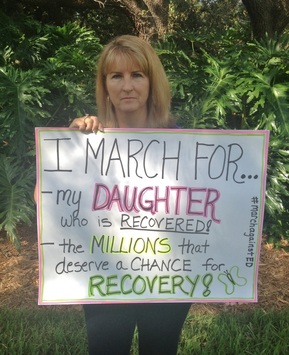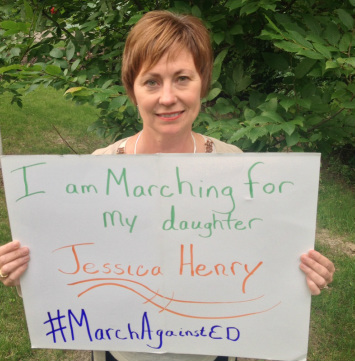by Cherie' Monarch

12 Things for Professionals and Families to contemplate before supporting that your patient or loved one attend college
An Open Letter to all eating disorder professionals, treatment centers, therapists, dietitians, medical doctors, providers, and families of a loved one with an eating disorder...
Dear Treatment Provider,
My child has been battling an eating disorder and may be a patient of yours, may be in a treatment facility for eating disorders, may have been recently discharged from the treatment facility, or may be undergoing outpatient treatment. I might have sat in your office or in your treatment program desperate for your guidance on whether to allow my child to start or go back to college. I might have even been pleading for you to encourage my child to take a gap year or postpone college. I appreciate how much you care for my child and want to see my child live a full life. With that in mind, please allow me to share these 12 things from our experience as mothers of young adults with eating disorders as you consider whether to encourage or recommend that my child attend college, especially if they are attending college away from home or for the first time. If I am the one failing to recognize these things, please teach me and help me understand that college may not be appropriate for my loved one at this time.
1. My loved one needs to recover in a supported environment. As you well know my child has been diagnosed with and is struggling with a life-threatening illness, an illness that has the highest mortality rate of any other mental illness. Recovery from an eating disorder is no different than battling cancer. We wouldn’t recommend that a young adult who was battling cancer attend college hours away from their family where they cannot be closely monitored for physical and mental decompensation, supported, and cared for. It is no different for someone recovering from an eating disorder. In fact, it is even more critical that someone recovering from an eating disorder be closely monitored and supported since they can attain medical stability and still be very mentally compromised. Unfortunately, despite one’s best efforts and skill, it may not be possible to accurately ascertain in a 50 minute session every week or two while they are at college or in a phone call to home whether or not there has been physical or mental impairment...especially for a young adult early in recovery who is not totally invested in their recovery. Please encourage my loved one to remain in an environment where they are closely monitored and supported.
2. My loved one deserves and requires time to recover. TIME. Recovery takes time. Solid recovery takes time and practice. It takes walking through the fire every single day. It requires making difficult choices every day. It requires exposure. It requires failing one day and getting up and starting all over the next day. If my loved one is encouraged to attend college two weeks after discharging from a treatment program, or four months after discharging, or is still actively engaging in their eating disorder, or still uncertain as to what recovery looks like, how can they be expected to attend and thrive in college? The truth is they can’t. Attending college prematurely is not a recipe for success, but a recipe for failure.
3. The college environment as a whole does not promote recovery. Sending someone to college when their legs are still "wobbly" will likely cause them to collapse rather than strengthen. College students are faced with a whole new level of stressors and triggers around diet and exercise that they can’t escape... which are endorsed by roommates, college professors, student population, clubs, and fraternities and sororities. Typical and constant conversation on college campuses revolve around dieting, cleansing, "clean" eating, wanting to lose a few pounds, constant discussion of what others consider good and bad foods, constant judgment and commentary as to what food you choose to put on your plate, and direct line of questioning such as "How can you eat that? I could never eat that! I would weigh 500 pounds if I ate that!" College is an environment that promotes missed meals, unhealthy exercise, etc. all in the name of good health and staying fit. Actions and comments that are prevalent on college campuses will test and challenge even those in the strongest recovery. As you know, it takes a very long time for body image struggles to abate, making these comments even more triggering and dangerous. My loved one should remain in an environment that promotes health and recovery until they are flourishing.
4. Anxiety typically reaches a heightened state in a college environment. Many of our loved ones are plagued with anxiety and OCD, co-morbids that often times fuel the eating disorder. College will add more stress and anxiety rather than alleviate it. Especially for a new college freshman. We know that the increased pressure and anxiety of leaving home can lead to mental health challenges even for those not struggling with an eating disorder. Data from the 2013 National College Health Assessment II indicate that about one-third of college students across the United States had problems functioning because of depression in the last 12 months; almost half said they had felt overwhelming anxiety in the last year, 20 percent said they had seriously considered suicide in their lifetime, and 5.8 percent said they had attempted suicide. College students are trying to navigate a high-pressure academic environment, are faced with difficult social nuances including trying to establish friend groups, and trying to eat in the college environment where everybody is obsessed with dieting, thinness, exercise, constant talk of unwanted pounds and how to get rid of them. This is extremely challenging even in the best of circumstances. Self-care rarely makes the radar in these conditions. Encouraging patients who are trying to recover, many who are plagued by perfectionism, to enter an environment that is riddled with anxiety and stress does not promote recovery and often times cripples them and will result in relapse or decompensation.
5. Recovery takes commitment and accountability. Many sufferers enter treatment after the spring semester. They know they need support but don't want to dedicate the time and energy necessary to attain recovery. They want a quick admission to a residential treatment center where they can be "patched" or receive a "quick fix" so they can get back to the life of doing college. They are not committed nor are they invested in their treatment. Their only motivation is to "get back to school or start school on time". This singular goal defines the length of treatment, type of treatment, and is the focus of the treatment team and often times the family. What would it be like if they actually committed to treatment and recovery and invested in themselves? If they actually remained in treatment for the recommended length of stay based on their physical and mental condition. If they actually made the commitment to be "present" in their treatment, to actually put recovery on their priority list rather then on the back burner. It is important for professionals to not let the client "drive" the timeline especially when their goals are not recovery minded and do not promote health and wellness.
6. My loved one must be able to properly and adequately nourish themselves before they attend college. Learning this skill takes a tremendous amount of time, practice, and exposure to different environments. Many of your patients who are recovering from an eating disorder have been doing so under the watchful eye of their family. Many still do not eat in restaurants, still try to skip snacks and meals, do not eat with friends or family, do not self-serve adequate portions without supervision, eat only their "safe" foods as a matter of routine, only drink water except for the occasional coffee or diet drink, have a very structured food regimen, would never ingest a food for which they do not know the caloric content, and left to their own devices their meal plan would look like a patient with orthorexia. My child may tell you they're following the meal plan prescribed to them and eating every bite, but the reality is often quite different. My loved one may "look" physically healthy, or could be underweight, or could be considered overweight, but does not have the capability to properly and continually nourish themselves without oversight. How can a patient who is terrified to eat in a restaurant enter a college cafeteria or a local college hang out and be expected to consume the nutrition their body needs for months on end without oversight and encouragement?
7. It is Imperative that my loved one have completely restored mental "state" and well practiced coping skills in order to thrive academically. Students must be in a state of physical, psychological, emotional, intellectual, social, and spiritual well-being before attending college. It is imperative that the mind, body, and brain be healed so that they have the opportunity to have a positive experience at college. Learning at the college level requires strong physical and mental health. Anxiety, OCD, stress, and depression, which often accompany eating disorders, are rampant on college campuses and will cripple and impair learning. My child might be weight restored and have complete healing of physical state, but is still mentally compromised. It is critical that my loved one practice and excel at coping skills to navigate increased anxiety and depression that often escalate when attending college. Unmanaged and overwhelming levels of stress, anxiety and depression are detrimental to academic performance and success.
8. My loved one needs time to mature. Due to the fact they were saddled with an eating disorder while an adolescent their development has been stunted. They may be 18 years old or a presidential scholar, but they do not possess the mental capacity and social experiences to live on their own. Although my loved one is physically healed, they may be unable to have a rational conversation without emotional escalation; they may not possess the maturity or social skills of their peers; they may not have the life skills to navigate living on their own; they may not have had the opportunity to experience social relationships with peers and may develop additional behavioral health problems as a consequence. Unhealthy maladaptive strategies to cope with the additional stress and anxiety of college can include binge drinking, drug use, cutting, self harm, pornography, gambling and sexual promiscuity. Several of these behaviors, such as binge drinking, are reinforced and supported in the social culture of the college environment. These maladaptive coping strategies can lead to significant personal, social, and community consequences from regretted actions while intoxicated such as "hooking up", sexual assault, rape, “soft” prostitution, and crime. These actions can change the trajectory of their entire life. Postponing college to allow my loved one to heal, to mature, to develop mental strength and stamina, and to learn to employ healthy coping skills is the only answer. Please support my loved one’s mental health and encourage them to honor themselves and their recovery by postponing college.
9. Delaying my loved one’s college plans has nothing to do with separation anxiety. It can look like families want to defer their child attending college because they are not emotionally ready for them to leave home. Some may think we are "enmeshed". My child may complain to you that we are trying to “control” them by not allowing them to launch yet. I assure you that is far from the reality. While it is sad to see our children grow up and leave home, the sadness lasts only for a moment. This is part of the normal growth process in life. I have actually dreamt of the moment when my loved one would become a young adult and have the opportunity to dream their own dreams, to make their path in the world. The fact my loved one is not physically and/or mentally ready to attend college actually breaks my heart. My only hope is that they can spend the next year healing and attaining solid recovery so they can go on and pursue their dreams. My job is to launch my child, but not until they are ready to do so without self-destructing. My loved one needs your support to understand this.
10. A contract will not guarantee that they enter or stay in recovery. A contract is a critical "tool" to solidify and clarify what everyone's expectations are -- the patient, the family, the treatment team. However when my loved one is away at college it is extremely difficult to put enough adequate provisions in the contract to ensure that my loved one remains medically, physically, and mentally stable. Certainly you can put provisions in that they must see a treatment team, that they must maintain a certain weight, no eating disorder behaviors, and no mental decompensation. But who is going to properly monitor that there is no change in physical and mental state when they are hours away from home? A weekly or biweekly visit with a therapist or dietitian will likely not be adequate enough to properly assess their physical and mental status. And let's face it, often times patients aren't totally honest especially when they are not yet solidly in recovery. They can say they are eating their meal plan, but are they? They can say they are not using behaviors, but are they? They can even maintain their weight, but that doesn’t mean that their eating is not very disordered. Things can change in the months between family visits. Drastically. Waiting until patients are solidly in recovery … Six months or year can make a huge impact. Maybe before entering into a contract that dictates what needs to happen for my child to stay in college a better idea would be to first write a contract agreeing that if my child remains solidly in recovery for one year that they then can attend college – with a new contract.
11. College is a large financial commitment, one that should not be taken lightly. Let's be honest. Treating an eating disorder is very expensive. Many families have suffered a large financial loss as a result of the expenses associated with eating disorder treatment. Many families have received limited to no coverage for eating disorder treatment centers, therapists, and dietitians. Families have emptied savings accounts, college funds, retirement accounts, taken second mortgages, gotten second jobs, and sold their homes in an effort to pay the expenses associated with securing eating disorder treatment for their loved one. Recommending that my loved one attend college when they are not solidly in recovery or on the brink of recovery could saddle our family with additional financial hardship. College tuition, room and board, and textbooks equate to tens of thousands of dollars every single semester. Putting this at risk by encouraging my loved one to attend college prematurely may potentially eliminate our ability to assist them financially and may create undo financial hardship on our family. My loved one needs your help to understand that attending college at their parent’s expense is a privilege, and while it is something we may want to provide for our child, we want to do so only when we feel they are ready to thrive in college.
12. The risk is not worth the potential reward. It has been stated that the relapse rate for sufferers that attend college is 50%. This is for patients who are reported to be in recovery. I'm certain the relapse rate for those just stepping into recovery, or trying to, is much higher. So one has to ask… Why risk it? Why risk the financial investment by the family. Why risk damaging the college experience? Why risk recovery itself? Why risk their life? Is attending college prematurely worth the small potential reward? It makes more sense to spend the next year getting feet firmly planted on the ground and solidly in recovery. If, once they are solidly in recovery, it is determined that college is a good fit and one of their goals, why not take this path? There is no timeline and there is no mandate that loved ones have to attend college immediately after high school. In fact, taking a gap year helps many to know what field they want to pursue. So as a treatment professional, we ask you to recommend to your patients that they put self-care as number one on their priority list. Advise them to take the time that is necessary to practice recovery so that in the future they may have the opportunity to attend college and truly have "the college experience". Help them to have the experience the way they dreamed college would be and not an experience riddled with unmanageable anxiety, regrettable choices and experiences, decompensation, and frustration.
As families, we often lean on you to guide us as we help our loved ones recover from an eating disorder. Many times we are not completely EDucated as to what recovery looks like. We want to believe that our child can have a “normal” life. That our child can follow the timeline that appears to be mandated by society. Sometimes our intuition is telling us or we may not recognize that it's premature. That our child is not ready. That they should not be taking on the additional anxiety and stress by attending college when they're not completely physically and mentally restored. We look to you, the experts, to guide us. To help point our loved one and our family in the right direction. To make the recommendation that does not leave us picking up the pieces. To help ensure that we are making the right decision. Ultimately, the decision is ours. But the problem therein lies in the fact that many of us do not have all of the information to make an educated decision. So most will go with the recommendation of the eating disorder professional. If this were your son or daughter who has battled this life threatening illness, what would you recommend? If this were a patient just receiving their final chemo treatment, what would you recommend? As families, we are asking you to make the recommendation that best supports and reinforces their recovery. After all, if our loved one has the opportunity to truly experience college solidly in recovery they may be the one that discovers the cure for cancer. Shouldn't they have that chance?
We thank you for your continued and dedicated support of our loved ones. Words cannot express our gratitude for your investment and commitment to our child's well-being.
With deepest gratitude,
Families Everywhere
Written by Cherie’ Monarch. A mom who lived this journey.
To contact the author: email [email protected] or phone 727-422-3668
If you are caring for a loved one with an eating disorder, please contact Eating Disorder Family Support Network - Mom2Mom and Dad2Dad on facebook. No one should walk this journey alone.
Contact Alliance for Eating Disorders Awareness for support at (866) 662.1235 toll free or [email protected]. The Alliance for Eating Disorders Awareness ("The Alliance") is nonprofit organization dedicated to providing programs and activities aimed at outreach, education, and early intervention for all eating disorders. The Alliance creates a bridge for those needing and seeking help by connecting people with resources and information to assist them in their recovery.
An Open Letter to all eating disorder professionals, treatment centers, therapists, dietitians, medical doctors, providers, and families of a loved one with an eating disorder...
Dear Treatment Provider,
My child has been battling an eating disorder and may be a patient of yours, may be in a treatment facility for eating disorders, may have been recently discharged from the treatment facility, or may be undergoing outpatient treatment. I might have sat in your office or in your treatment program desperate for your guidance on whether to allow my child to start or go back to college. I might have even been pleading for you to encourage my child to take a gap year or postpone college. I appreciate how much you care for my child and want to see my child live a full life. With that in mind, please allow me to share these 12 things from our experience as mothers of young adults with eating disorders as you consider whether to encourage or recommend that my child attend college, especially if they are attending college away from home or for the first time. If I am the one failing to recognize these things, please teach me and help me understand that college may not be appropriate for my loved one at this time.
1. My loved one needs to recover in a supported environment. As you well know my child has been diagnosed with and is struggling with a life-threatening illness, an illness that has the highest mortality rate of any other mental illness. Recovery from an eating disorder is no different than battling cancer. We wouldn’t recommend that a young adult who was battling cancer attend college hours away from their family where they cannot be closely monitored for physical and mental decompensation, supported, and cared for. It is no different for someone recovering from an eating disorder. In fact, it is even more critical that someone recovering from an eating disorder be closely monitored and supported since they can attain medical stability and still be very mentally compromised. Unfortunately, despite one’s best efforts and skill, it may not be possible to accurately ascertain in a 50 minute session every week or two while they are at college or in a phone call to home whether or not there has been physical or mental impairment...especially for a young adult early in recovery who is not totally invested in their recovery. Please encourage my loved one to remain in an environment where they are closely monitored and supported.
2. My loved one deserves and requires time to recover. TIME. Recovery takes time. Solid recovery takes time and practice. It takes walking through the fire every single day. It requires making difficult choices every day. It requires exposure. It requires failing one day and getting up and starting all over the next day. If my loved one is encouraged to attend college two weeks after discharging from a treatment program, or four months after discharging, or is still actively engaging in their eating disorder, or still uncertain as to what recovery looks like, how can they be expected to attend and thrive in college? The truth is they can’t. Attending college prematurely is not a recipe for success, but a recipe for failure.
3. The college environment as a whole does not promote recovery. Sending someone to college when their legs are still "wobbly" will likely cause them to collapse rather than strengthen. College students are faced with a whole new level of stressors and triggers around diet and exercise that they can’t escape... which are endorsed by roommates, college professors, student population, clubs, and fraternities and sororities. Typical and constant conversation on college campuses revolve around dieting, cleansing, "clean" eating, wanting to lose a few pounds, constant discussion of what others consider good and bad foods, constant judgment and commentary as to what food you choose to put on your plate, and direct line of questioning such as "How can you eat that? I could never eat that! I would weigh 500 pounds if I ate that!" College is an environment that promotes missed meals, unhealthy exercise, etc. all in the name of good health and staying fit. Actions and comments that are prevalent on college campuses will test and challenge even those in the strongest recovery. As you know, it takes a very long time for body image struggles to abate, making these comments even more triggering and dangerous. My loved one should remain in an environment that promotes health and recovery until they are flourishing.
4. Anxiety typically reaches a heightened state in a college environment. Many of our loved ones are plagued with anxiety and OCD, co-morbids that often times fuel the eating disorder. College will add more stress and anxiety rather than alleviate it. Especially for a new college freshman. We know that the increased pressure and anxiety of leaving home can lead to mental health challenges even for those not struggling with an eating disorder. Data from the 2013 National College Health Assessment II indicate that about one-third of college students across the United States had problems functioning because of depression in the last 12 months; almost half said they had felt overwhelming anxiety in the last year, 20 percent said they had seriously considered suicide in their lifetime, and 5.8 percent said they had attempted suicide. College students are trying to navigate a high-pressure academic environment, are faced with difficult social nuances including trying to establish friend groups, and trying to eat in the college environment where everybody is obsessed with dieting, thinness, exercise, constant talk of unwanted pounds and how to get rid of them. This is extremely challenging even in the best of circumstances. Self-care rarely makes the radar in these conditions. Encouraging patients who are trying to recover, many who are plagued by perfectionism, to enter an environment that is riddled with anxiety and stress does not promote recovery and often times cripples them and will result in relapse or decompensation.
5. Recovery takes commitment and accountability. Many sufferers enter treatment after the spring semester. They know they need support but don't want to dedicate the time and energy necessary to attain recovery. They want a quick admission to a residential treatment center where they can be "patched" or receive a "quick fix" so they can get back to the life of doing college. They are not committed nor are they invested in their treatment. Their only motivation is to "get back to school or start school on time". This singular goal defines the length of treatment, type of treatment, and is the focus of the treatment team and often times the family. What would it be like if they actually committed to treatment and recovery and invested in themselves? If they actually remained in treatment for the recommended length of stay based on their physical and mental condition. If they actually made the commitment to be "present" in their treatment, to actually put recovery on their priority list rather then on the back burner. It is important for professionals to not let the client "drive" the timeline especially when their goals are not recovery minded and do not promote health and wellness.
6. My loved one must be able to properly and adequately nourish themselves before they attend college. Learning this skill takes a tremendous amount of time, practice, and exposure to different environments. Many of your patients who are recovering from an eating disorder have been doing so under the watchful eye of their family. Many still do not eat in restaurants, still try to skip snacks and meals, do not eat with friends or family, do not self-serve adequate portions without supervision, eat only their "safe" foods as a matter of routine, only drink water except for the occasional coffee or diet drink, have a very structured food regimen, would never ingest a food for which they do not know the caloric content, and left to their own devices their meal plan would look like a patient with orthorexia. My child may tell you they're following the meal plan prescribed to them and eating every bite, but the reality is often quite different. My loved one may "look" physically healthy, or could be underweight, or could be considered overweight, but does not have the capability to properly and continually nourish themselves without oversight. How can a patient who is terrified to eat in a restaurant enter a college cafeteria or a local college hang out and be expected to consume the nutrition their body needs for months on end without oversight and encouragement?
7. It is Imperative that my loved one have completely restored mental "state" and well practiced coping skills in order to thrive academically. Students must be in a state of physical, psychological, emotional, intellectual, social, and spiritual well-being before attending college. It is imperative that the mind, body, and brain be healed so that they have the opportunity to have a positive experience at college. Learning at the college level requires strong physical and mental health. Anxiety, OCD, stress, and depression, which often accompany eating disorders, are rampant on college campuses and will cripple and impair learning. My child might be weight restored and have complete healing of physical state, but is still mentally compromised. It is critical that my loved one practice and excel at coping skills to navigate increased anxiety and depression that often escalate when attending college. Unmanaged and overwhelming levels of stress, anxiety and depression are detrimental to academic performance and success.
8. My loved one needs time to mature. Due to the fact they were saddled with an eating disorder while an adolescent their development has been stunted. They may be 18 years old or a presidential scholar, but they do not possess the mental capacity and social experiences to live on their own. Although my loved one is physically healed, they may be unable to have a rational conversation without emotional escalation; they may not possess the maturity or social skills of their peers; they may not have the life skills to navigate living on their own; they may not have had the opportunity to experience social relationships with peers and may develop additional behavioral health problems as a consequence. Unhealthy maladaptive strategies to cope with the additional stress and anxiety of college can include binge drinking, drug use, cutting, self harm, pornography, gambling and sexual promiscuity. Several of these behaviors, such as binge drinking, are reinforced and supported in the social culture of the college environment. These maladaptive coping strategies can lead to significant personal, social, and community consequences from regretted actions while intoxicated such as "hooking up", sexual assault, rape, “soft” prostitution, and crime. These actions can change the trajectory of their entire life. Postponing college to allow my loved one to heal, to mature, to develop mental strength and stamina, and to learn to employ healthy coping skills is the only answer. Please support my loved one’s mental health and encourage them to honor themselves and their recovery by postponing college.
9. Delaying my loved one’s college plans has nothing to do with separation anxiety. It can look like families want to defer their child attending college because they are not emotionally ready for them to leave home. Some may think we are "enmeshed". My child may complain to you that we are trying to “control” them by not allowing them to launch yet. I assure you that is far from the reality. While it is sad to see our children grow up and leave home, the sadness lasts only for a moment. This is part of the normal growth process in life. I have actually dreamt of the moment when my loved one would become a young adult and have the opportunity to dream their own dreams, to make their path in the world. The fact my loved one is not physically and/or mentally ready to attend college actually breaks my heart. My only hope is that they can spend the next year healing and attaining solid recovery so they can go on and pursue their dreams. My job is to launch my child, but not until they are ready to do so without self-destructing. My loved one needs your support to understand this.
10. A contract will not guarantee that they enter or stay in recovery. A contract is a critical "tool" to solidify and clarify what everyone's expectations are -- the patient, the family, the treatment team. However when my loved one is away at college it is extremely difficult to put enough adequate provisions in the contract to ensure that my loved one remains medically, physically, and mentally stable. Certainly you can put provisions in that they must see a treatment team, that they must maintain a certain weight, no eating disorder behaviors, and no mental decompensation. But who is going to properly monitor that there is no change in physical and mental state when they are hours away from home? A weekly or biweekly visit with a therapist or dietitian will likely not be adequate enough to properly assess their physical and mental status. And let's face it, often times patients aren't totally honest especially when they are not yet solidly in recovery. They can say they are eating their meal plan, but are they? They can say they are not using behaviors, but are they? They can even maintain their weight, but that doesn’t mean that their eating is not very disordered. Things can change in the months between family visits. Drastically. Waiting until patients are solidly in recovery … Six months or year can make a huge impact. Maybe before entering into a contract that dictates what needs to happen for my child to stay in college a better idea would be to first write a contract agreeing that if my child remains solidly in recovery for one year that they then can attend college – with a new contract.
11. College is a large financial commitment, one that should not be taken lightly. Let's be honest. Treating an eating disorder is very expensive. Many families have suffered a large financial loss as a result of the expenses associated with eating disorder treatment. Many families have received limited to no coverage for eating disorder treatment centers, therapists, and dietitians. Families have emptied savings accounts, college funds, retirement accounts, taken second mortgages, gotten second jobs, and sold their homes in an effort to pay the expenses associated with securing eating disorder treatment for their loved one. Recommending that my loved one attend college when they are not solidly in recovery or on the brink of recovery could saddle our family with additional financial hardship. College tuition, room and board, and textbooks equate to tens of thousands of dollars every single semester. Putting this at risk by encouraging my loved one to attend college prematurely may potentially eliminate our ability to assist them financially and may create undo financial hardship on our family. My loved one needs your help to understand that attending college at their parent’s expense is a privilege, and while it is something we may want to provide for our child, we want to do so only when we feel they are ready to thrive in college.
12. The risk is not worth the potential reward. It has been stated that the relapse rate for sufferers that attend college is 50%. This is for patients who are reported to be in recovery. I'm certain the relapse rate for those just stepping into recovery, or trying to, is much higher. So one has to ask… Why risk it? Why risk the financial investment by the family. Why risk damaging the college experience? Why risk recovery itself? Why risk their life? Is attending college prematurely worth the small potential reward? It makes more sense to spend the next year getting feet firmly planted on the ground and solidly in recovery. If, once they are solidly in recovery, it is determined that college is a good fit and one of their goals, why not take this path? There is no timeline and there is no mandate that loved ones have to attend college immediately after high school. In fact, taking a gap year helps many to know what field they want to pursue. So as a treatment professional, we ask you to recommend to your patients that they put self-care as number one on their priority list. Advise them to take the time that is necessary to practice recovery so that in the future they may have the opportunity to attend college and truly have "the college experience". Help them to have the experience the way they dreamed college would be and not an experience riddled with unmanageable anxiety, regrettable choices and experiences, decompensation, and frustration.
As families, we often lean on you to guide us as we help our loved ones recover from an eating disorder. Many times we are not completely EDucated as to what recovery looks like. We want to believe that our child can have a “normal” life. That our child can follow the timeline that appears to be mandated by society. Sometimes our intuition is telling us or we may not recognize that it's premature. That our child is not ready. That they should not be taking on the additional anxiety and stress by attending college when they're not completely physically and mentally restored. We look to you, the experts, to guide us. To help point our loved one and our family in the right direction. To make the recommendation that does not leave us picking up the pieces. To help ensure that we are making the right decision. Ultimately, the decision is ours. But the problem therein lies in the fact that many of us do not have all of the information to make an educated decision. So most will go with the recommendation of the eating disorder professional. If this were your son or daughter who has battled this life threatening illness, what would you recommend? If this were a patient just receiving their final chemo treatment, what would you recommend? As families, we are asking you to make the recommendation that best supports and reinforces their recovery. After all, if our loved one has the opportunity to truly experience college solidly in recovery they may be the one that discovers the cure for cancer. Shouldn't they have that chance?
We thank you for your continued and dedicated support of our loved ones. Words cannot express our gratitude for your investment and commitment to our child's well-being.
With deepest gratitude,
Families Everywhere
Written by Cherie’ Monarch. A mom who lived this journey.
To contact the author: email [email protected] or phone 727-422-3668
If you are caring for a loved one with an eating disorder, please contact Eating Disorder Family Support Network - Mom2Mom and Dad2Dad on facebook. No one should walk this journey alone.
Contact Alliance for Eating Disorders Awareness for support at (866) 662.1235 toll free or [email protected]. The Alliance for Eating Disorders Awareness ("The Alliance") is nonprofit organization dedicated to providing programs and activities aimed at outreach, education, and early intervention for all eating disorders. The Alliance creates a bridge for those needing and seeking help by connecting people with resources and information to assist them in their recovery.









 RSS Feed
RSS Feed